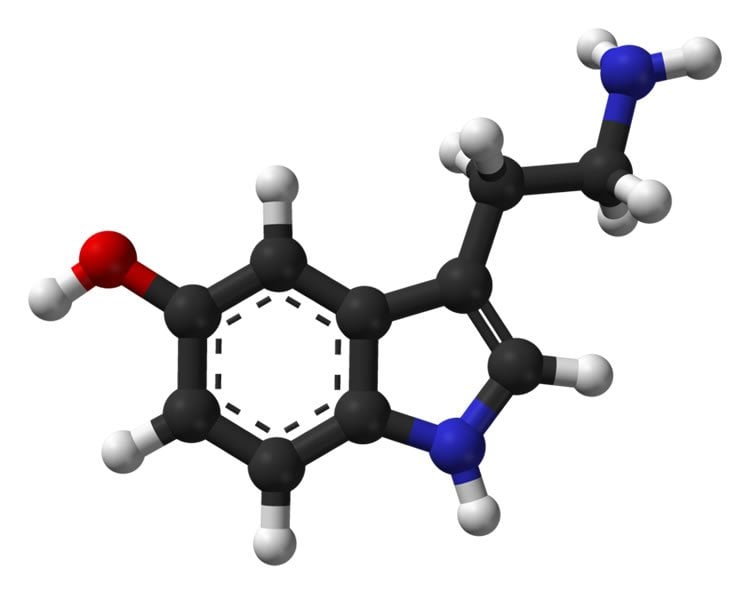Ra symptoms and pathology worse in mice missing enzyme needed for serotonin synthesis, according to report in the American Journal of Pathology.
For the first time, serotonin (5-hydroxytryptamine, 5-HT) has been directly implicated in the pathophysiology of rheumatoid arthritis (RA). Although 5-HT is predominantly known as a neurotransmitter within the central nervous system, new evidence points to additional important functions for serotonin in the periphery. A report in The American Journal of Pathology shows that experimentally-induced RA in serotonin-deficient mice is worse than disease reported in controls and that some effects of RA can be reduced by serotonin or its agonists (compounds that activate serotonin receptors).
These findings may lay the groundwork for new treatment approaches for RA. “Our study highlights that 5-HT has a direct immunoregulatory role in arthritis. The development of treatments targeting 5-HT or 5-HT receptors could represent an exciting prospect to regulate the immune response in RA and open new perspectives to improve the therapeutic options for patients,” explained co-lead investigator Marie-Christine de Vernejoul of BIOSCAR, INSERM UMR_S1132 of the Hôpital Lariboisière, Unité Mixte de Recherche (UMR) 1132, Université Paris Diderot (Paris, France).
The investigators used a mouse model of RA known as collagen-induced arthritis (CIA) that produces features similar to that of human RA. Disease manifestations include cartilage and bone destruction, as well as the activation of cells responsible for bone resorption, known as osteoclasts. They compared the effects of CIA in normal mice to those in mice genetically bred with a deficiency in tryptophan hydroxylase-1, a key enzyme needed for serotonin production in peripheral tissues.
The investigators found that both the number and activity of osteoclasts were higher in 5-HT-deficient mice with arthritis. In addition, more bone resorption was detected both at the affected joints and at remote sites.
The serotonin-deficient mice with arthritis also showed changes in certain cell-signaling molecules known as cytokines (higher IL-17, higher TNF-α, and lower IL-4) in their paws. Specifically, they displayed a shift in the balance between T cell subtypes, especially regulatory T cells and Th17 lymphocytes.

“Altogether, our data show that 5-HT deficient mice are characterized by a relative, dampened expansion of Treg associated with an enhanced shift toward a Th17 phenotype, a situation previously described in patients with arthritis,” noted co-lead investigator Francine Côté of the Laboratory of Cellular and Molecular Mechanisms of Hematological Disorders and Therapeutic Implications Institut Imagine INSERM U1163/CNRS ERL 8254, Hôpital Necker (Paris, France).
Subsequent experiments using cell cultures showed that the balance between Th17/Treg cells could be normalized by the addition of 5-HT or 5-HT receptor agonists, revealing a direct regulatory role of serotonin in RA. These novel data suggest a new therapeutic target that could be important for this disabling disease.
Funding: The study was funded by Arthritis Courtin’s Fundation, la Fondation pour la Recherche Medical, le Centre National de la Recherche Scientifique, Paris Descartes.
Source: Eileen Leahy – Elsevier
Image Source: The image is credited to Ben Mills and is in the public domain.
Original Research: Abstract for “Serotonin Is Involved in Autoimmune Arthritis through Th17 Immunity and Bone Resorption” by Yasmine Chabbi-Achengli, Tereza Coman, Corinne Collet, Jacques Callebert, Michelangelo Corcelli, Hilène Lin, Rachel Rignault, Michel Dy, Marie-Christine de Vernejoul, and Francine Côté in American Journal of Pathology. Published online March 8 2016 doi:10.1016/j.ajpath.2015.11.018
Abstract
Serotonin Is Involved in Autoimmune Arthritis through Th17 Immunity and Bone Resorption
Rheumatoid arthritis is a chronic disease that results in a disabling and painful condition as it progresses to destruction of the articular cartilage and ankylosis of the joints. Although the cause of the disease is still unknown, evidence argues that autoimmunity plays an important part. There are increasing but contradictory views regarding serotonin being associated with activation of immunoinflammatory pathways and the onset of autoimmune reactions. We studied serotonin’s involvement during collagen-induced arthritis in wild-type and Tph1−/− mice, which have markedly reduced peripheral serotonin levels. In wild-type mice, induction of arthritis triggered a robust increase in serotonin content in the paws combined with less inflammation. In Tph1−/− mice with arthritis, a marked increase in the clinical and pathologic arthritis scores was noticed. Specifically, in Tph1−/− mice with arthritis, a significant increase in osteoclast differentiation and bone resorption was observed with an increase in IL-17 levels in the paws and in Th17 lymphocytes in the draining lymph nodes, whereas T-regulatory cells were dampened. Ex vivo serotonin and agonists of the 5-HT2A and 5-HT2B receptors restored IL-17 secretion from splenocytes and Th17 cell differentiation in Tph1−/− mice. These findings indicate that serotonin plays a fundamental role in arthritis through the regulation of the Th17/T-regulatory cell balance and osteoclastogenesis.
“Serotonin Is Involved in Autoimmune Arthritis through Th17 Immunity and Bone Resorption” by Yasmine Chabbi-Achengli, Tereza Coman, Corinne Collet, Jacques Callebert, Michelangelo Corcelli, Hilène Lin, Rachel Rignault, Michel Dy, Marie-Christine de Vernejoul, and Francine Côté in American Journal of Pathology. Published online March 8 2016 doi:10.1016/j.ajpath.2015.11.018







